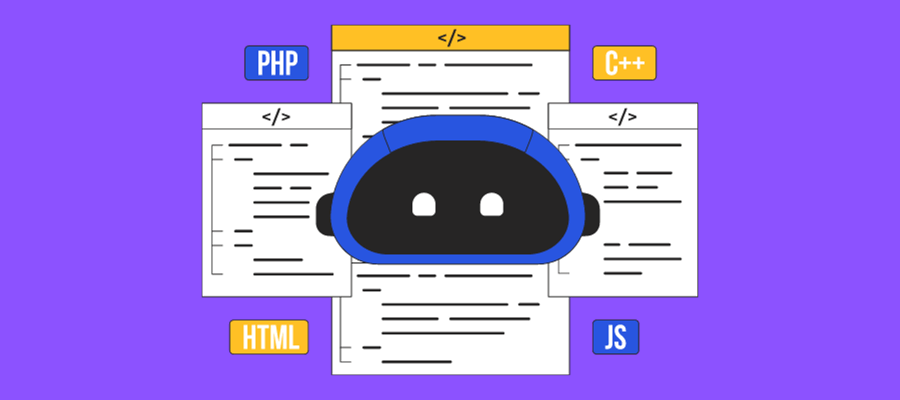The demand for the artificial intelligence industry has been at an all-time high in the last 1-2 years. Almost every business across various industries is now integrating AI in their workplace to improve efficiency and productivity.
As a result, the career opportunities for skilled artificial intelligence developers and engineers are at their peak.
If you want to understand the future scope and career guidance on becoming an AI expert, this guide is for you.
In this guide, I have answered the most common questions regarding artificial intelligence career paths, skills prerequisites, and learning roadmap in 2023.
Also, I will be sharing my learning experience of becoming an AI developer and learning resources that helped in my journey.
What you will learn:
Is Artificial Intelligence a Good Career Path in 2023?
Yes, Artificial intelligence (AI) is a great career choice in 2023 because the industry has a high market size, thousands of active jobs, and a competitive salary range.
Let me proof each reason one by one:
1. Industry demand (809% increase in past 5 years)
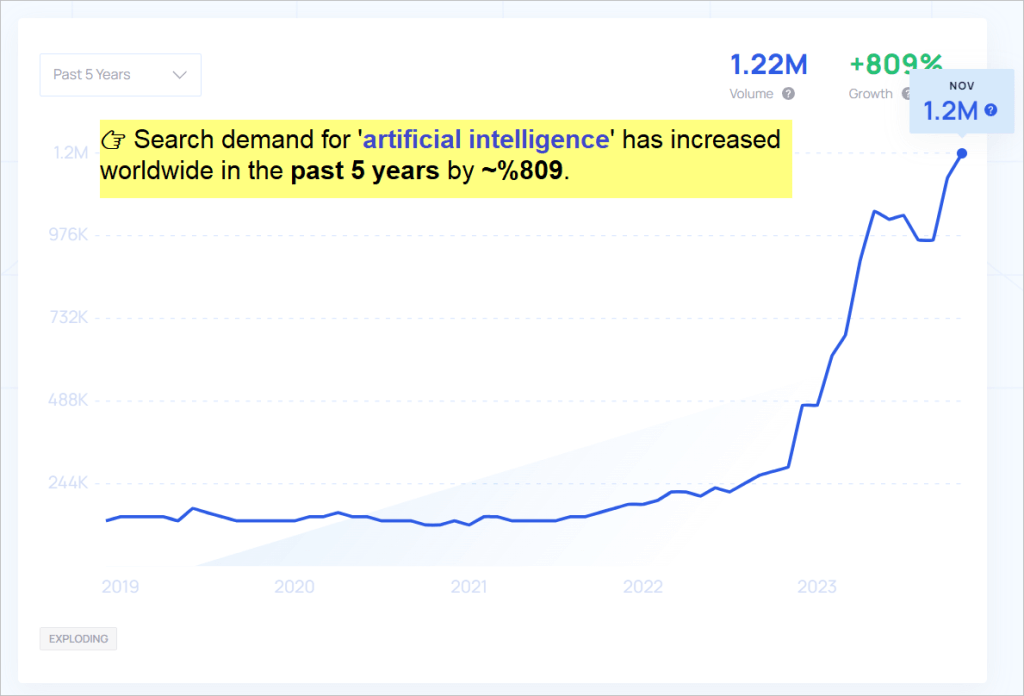
When I looked into the search demand for the term ‘artificial intelligence’ worldwide, I found an increase of 809% in the past 5 years— more demand for the technology means a higher demand for AI engineers and developers in the future.
2. Jobs availability (2k-5k active AI jobs)
When I looked for Artificial Intelligence jobs on LinkedIn, I saw over 18,500 job listings in India.
To find the current available AI jobs, I searched various job boards including LinkedIn, Glassdoor, and Indeed. In every job board, there are 2,000-5,000 active jobs available for the post of AI engineers or related job roles.
Here’s one example from Glassdoor:
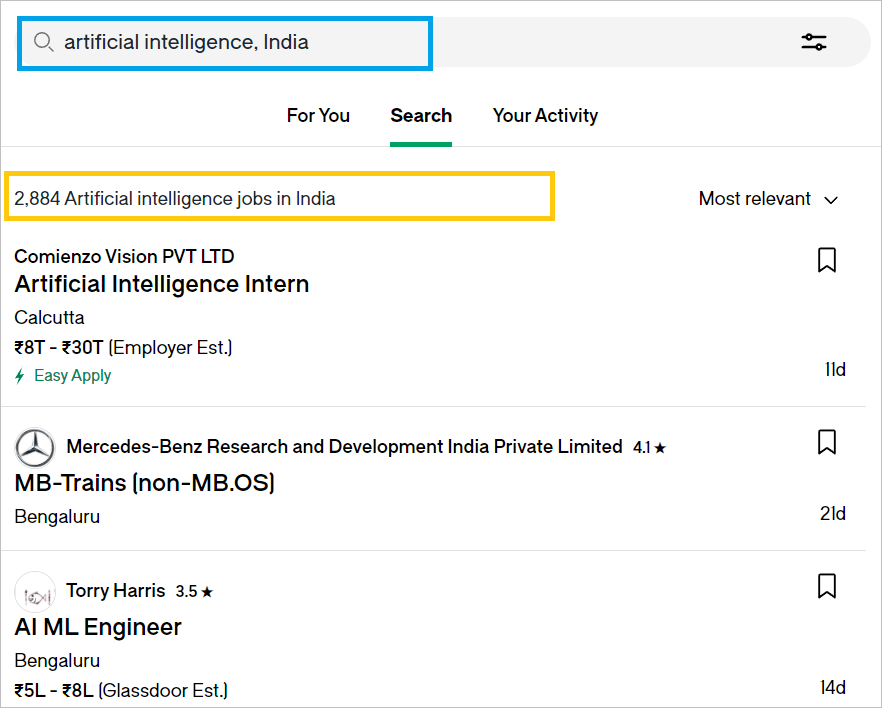
Another AI jobs example from LinkedIn where more than 3200 jobs are available:
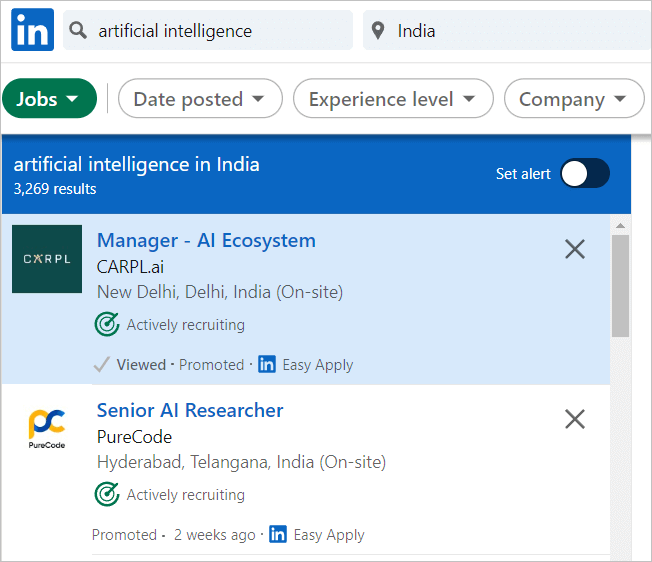
You can also find thousands of job opportunities for other AI branches such as machine learning, NLP, and so on.
3. Industry size (36.8% growth)
The AI industry is expanding big time for careers, with the market set to grow from $150.2 billion in 2023 to $1,345.2 billion in 2030, a fast growth of 36.8%, according to this annual market research.
This industry growth is driven by better algorithms and machine learning, plus the money-saving advantages of self-operating AI, making it a great field for job opportunities. As the need for self-operating AI rises, there’s a lot of potential for professionals in the AI world.
3. Salary ranges
The average annual salary of an AI developer in the USA is $103,724, based on salary.com.
Also, I compared the highest and lowest salary ranges available for AI developers in the US— it shows that Delaware offers the highest salary of $205,000 per annum, whereas Wisconsin offers the lowest average annual salary of $56,337.
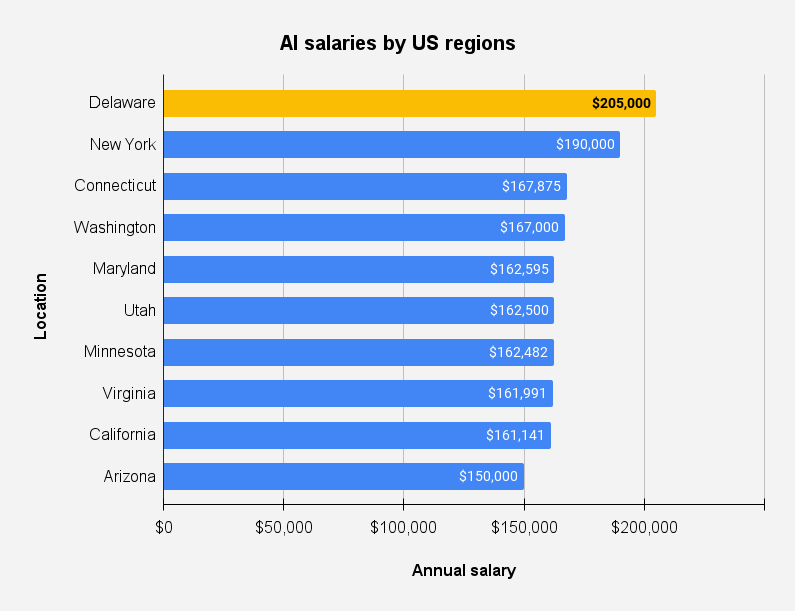
Below, you will find AI salary in the US for various regions:
What Do Artificial Intelligence Developers Do?
AI developers primarily design, develop, and deploy AI models. They work with a variety of technologies like machine learning, deep learning, and cloud computing.
Day-to-day tasks:
- Collect and clean data
- Build and train AI models
- Test and evaluate them
- Deploy and maintain the system
- Monitor and improve AI models
- Stay updated on new AI research and technologies.
Artificial Intelligence Career Paths in 2023
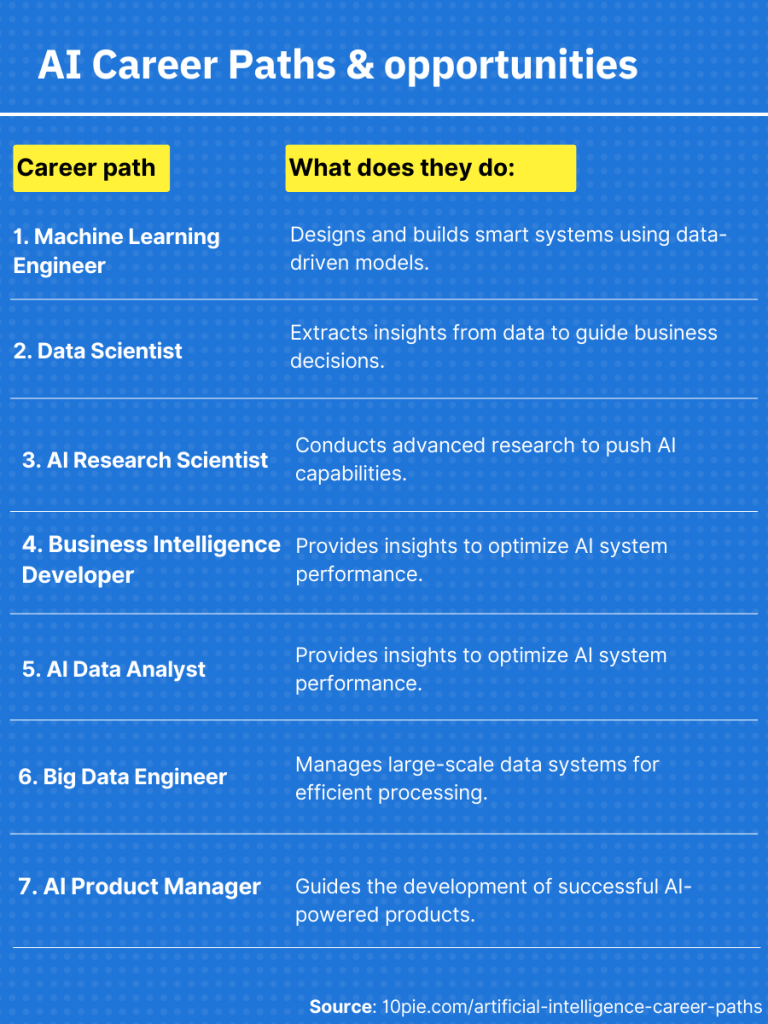
The field of AI offers a wide range of career opportunities and is continuing to expand. Here are some of the common job roles available:
1. Machine Learning Engineer
Machine learning engineers develop and implement algorithms that help computers learn from the data.
It includes working with large data sets, building and testing machine learning models, and tuning algorithms for best accuracy.
They develop models for projects such as recommendation systems, fraud detection, and predictive analytics.
This position would be a great fit for someone with an interest in neural networks or cloud applications.
Experience level: 1-3 years
Role type: Entry Level
Job responsibilities:
- Develop and improve machine learning models and software.
- Development of an end-to-end machine learning pipeline (including data extraction, automated labeling, training of deep learning models, and deployment.)
- Detects and fixes data leakage and evaluates model performance.
Average annual salary: INR 8,80,000 in India, $140,202 in the US.
Key skills required:
- Programming languages: Python, C++, Java.
- Communication and teamwork skills
- Strong mathematical and statistical understanding.
- Cloud computing platforms: AWS, Azure, GCP
- Working experience with libraries such as NumPy, pandas, and sci-kit-learn
- Machine learning algorithms, Deep learning frameworks
2. Data Scientist
Data scientists are experts in statistics, mathematics, and computer science and are widely considered to be “The sexiest job in the 21st century”.
They use tools and algorithms to analyze data and find patterns, from simple anomalies to complicated predictions about the future.
Becoming a skilled data scientist requires a graduate degree in statistics, computer science, or mathematics.

Experience level: 2-5
Role type: Mid Level
Job responsibilities:
- Conduct data analysis and data preprocessing.
- Explore new data sources and modeling techniques.
- Understand business requirements and build data products.
- Identify creative solutions to build training datasets.
- Train and optimize models.
- Work with engineers to turn them into a product
- Adopt newer methods and methodologies.
- Coach junior data scientists.
Average annual salary: INR 12,70,000 in India, $1,35,530 in the US.
Key skills required:
- Strong knowledge of machine learning and statistical analysis
- Strong foundation in math and statistics: probability, statistics, linear algebra, and calculus.
- Proficient in programming (Python, R, SQL)
- Data analysis (pandas, numpy, Scikit-learn) and visualization skills (Tableau, powerBI or matplotlib
- Good Communication and presentation skills
3. AI Research Scientist
AI research scientists are responsible for finding and developing new artificial intelligence algorithms.
They conduct research, write papers, and present the findings at conferences.
Requires a doctorate in statistics, computer science, or mathematics.
Experience level: 5-7
Role type: Senior
Job responsibilities:
- Research, prototype, and implement new algorithms and techniques.
- Publish research papers in renowned academic journals.
- Work with other researchers and engineers to build and deploy AI systems.
Average annual salary: ₹24,61,436 in India, $1,50,006 in the US.
Key skills required:
- PhD in Computer Science, Artificial Intelligence, or any related field.
- Strong programming skills (Python, C++, Java)
- Familiarity with Transformers and generative Diffusion models.
- Experience with deep learning frameworks (Keras, TensorFlow, Caffe, PyTorch)
- Machine learning and statistics knowledge
- Research and writing skills
- Knowledge of web development tools and LLMops/ Long Chain is a plus.
4. Business Intelligence Developer
Business Intelligence Developers study complex data and find trends to help clients make better business decisions.
They clean the data, build dashboards, and help people understand the data.
Experience level: 1+ years
Role Type: Entry Level or Fresher
Average annual salary: ₹7,93,962 in India, $1,02,799 in the US.
Job Responsibilities:
- Develop dashboards and reports
- Work with clients to understand business needs and implement them.
- Use Business Intelligence tools to get insights from data
- Evaluate and improve existing BI systems
Key Skills Required:
- Strong programming skills (Python, SQL)
- Knowledge of business terms and communication skills
- BI tools and technologies knowledge (Tableau, Power BI, Oracle BI, Looker)
- Experience with SQL queries, SQL Server Reporting Services (SSRS), or SQL Server Integration Services (SSIS)
5. AI Data Analyst
Data Analysts use AI techniques to analyze the data (The only difference from a BI Developer that uses visualization tools like powerbi and Tableau). They use ML algorithms to find patterns that are otherwise difficult or impossible to find using traditional methods.
Experience level: 1+ years
Role Type: Entry Level or Fresher
Average annual salary: ₹5,24,486 in India, $1,05,782 in the US.
Job Responsibilities:
- Prepare and clean data for machine learning models
- AI data analysts perform Exploratory data analysis (EDA) to get insights from data. This includes generating summary statistics, visualizing data, and identifying potential patterns, etc.
- Uses machine learning algorithms to detect correlations, clusters, or predictive relationships to identify patterns and trends.
- Integrates data from different sources.
- Communicates complex data to non-technical stakeholders.
- Ensures data quality and consistency.
Key Skills Required:
- Strong programming skills (Python, R, SQL)
- Data analysis and visualization skills
- Machine learning and statistics knowledge
- Expert knowledge of relational databases and data integration techniques.
6. Big Data Engineer
Big data engineers build and maintain the systems that businesses use to store large amounts of data.
They are in high demand as businesses rely more and more on data to make decisions.
Experience level: 3-5 years
Role Type: Mid
Average annual salary: ₹9,39,612 in India, $1,29,602 in the US
Job Responsibilities:
- Build and maintain data pipelines.
- develop and implement the data architecture roadmap.
- Define and manage service level agreements (SLAs) for data delivery.
- Mentor and train other engineers
- Optimize the systems
Key Skills Required:
- Strong programming skills in Python, Java, or Scala.
- Experience with big data processing technologies like Hadoop, Spark, and Kafka.
- Experience with cloud computing technologies like AWS, Azure, or GCP.
- Experience with common data formats like CSV, JSON, parquet, and Avro.
- Data cleaning and structuring experience (ETL).
- Knowledge of APIs (REST and SOAP), HTTP protocols, and API security.
- Experience with SQL, Git, and Airflow.
Big data learning resources:
7. AI Product Manager
AI Product Managers are like normal product managers but focus on using AI to make the products better.
Experience level: 3+ years
Role Type: Mid
Average annual salary: ₹30,65,721 in India, $1,65,068 in the US
Job Responsibilities:
- Find new markets and opportunities for the company.
- Define and implement the product strategy for AI products.
- Work with engineers to build and launch AI products.
- Make sure our products are constantly improving.
- Collect and analyze user feedback to improve the products.
Key Skills Required:
- Strong product management skills
- AI and machine learning knowledge
- Strong Communication skills
Skills and prerequisites to become an AI Developer
Below, I have listed the important skills and prerequisites to consider to become an AI developer. Also, I have shared some useful resources (websites, YouTube videos, free courses) that will help you in learning.
1. Programming Languages
Initially, start by learning Python, it should not be difficult if you are learning from the right resource. This is the base for AI development and practicing will help you get comfortable with debugging, data structures, and algorithms.
- Python is most popularly used to build models in AI.
- R is a statistical computing language best for data analysis and visualization
- Java/C++ can be used to deploy models.
Learning resources:
- Futurecoder: 100% free, and open-source platform, redefining interactive Python learning for beginners. With features like easy debugging and solution breadcrumbs, it makes coding accessible and enjoyable.
- Codewars: Improve your coding skills and engage with a vibrant community, all while building self-confidence and expanding your programming expertise in 55+ languages.
2. Machine Learning Algorithms
Machine Learning algorithms are basic tools that help the AI system understand the data and make predictions.
It’s important to know the different types of ML algorithms and how they work.It will help you choose the right algorithm for your model.
Start with simple algorithms like linear regression, and K-Nearest Neighbors. Once you have a good understanding of these, you move to complex ones like SVMs and deep learning algorithms.
Important machine learning algorithms you should learn:
- Linear Regression
- K-Nearest Neighbors
- Naive Bayes
- Support vector machine, etc.
Learning resources:
- Machine learning guides
- Learning resources for anyone who wants to become a research scientist in Deep Learning and NLP
- Data science course library by 365 data science
3. Deep Learning Frameworks
Deep Learning frameworks are libraries that make it easier to develop and deploy models.
They have a lot of pre-built components like layers, optimizers, and activation functions that save a lot of time and effort in training.
Each has its own strengths and weaknesses, so we choose the right framework for the specific task we are working with.
Important Deep Learning Frameworks you should learn:
- Tensorflow
- Pytorch
- Keras
- Transformers
Learning resources:
- Welcome (Deep Learning Specialization C1W1L01) (For Introduction)
- But what is a neural network? | Chapter 1, Deep learning
- Practical Deep Learning for Coders (Free)
RELEVANT READ:
In fact, Tesla also uses AI, NLP, and machine learning technologies in their car and autonomous driving models. Learn the AI implementation and use cases in Tesla.
4. Mathematics and statistics
Math and statistics are important for understanding and fine-tuning the AI algorithms as needed.
Having a basic understanding of the following mathematic concepts will help you in an AI job role:
- Linear algebra
- Calculus
- Probability and Statistics
Learning resources:
- Vectors | Chapter 1, Essence of linear algebra ( For linear algebra introduction)
- StatQuest with Josh Starmer (for statistics)
- Calculus 1 (Full-Length Videos) (for calculus)
5. Data Analysis and Data Manipulation
This deals with the first and crucial step of collecting, cleaning, and analyzing data.
Doing this will help you understand the data and prepare them appropriately.
A good understanding of this will help in training and evaluating the AI models.
- Power BI or Tableau
- MySQL or PostgreSQL
Learning resources:
- SQL for Data Analysis: Tutorial Introduction
- Google Data Analytics Professional Certificate (Free)
- Practice data analysis projects
- Tableau Tutorial for Beginners (YouTube video)
6. Cloud Service
Cloud services can be used to develop and deploy models on a large scale as they can store and process data.
They also provide some pre-trained models and tools like autoML (by GCP) and Amazon SageMaker (by AWS).
Learn how to use cloud service to store, process, and train AI models as it is widely used in real-time industry-level projects.
Learning resources:
- Cloud Computing Basics (Cloud 101) Course (LearnQuest) | Coursera (Free)
- How to Become a Data Engineer | Udacity (For AWS)
- Google Cloud Fundamentals: Core Infrastructure (Free)
After familiarizing yourself with the above skills,
- Work on personal projects – To gain experience (find AI project and seminar topics for references)
- Contribute to open source projects – this way you learn from other developers as well
- Attend workshops and conferences – great for networking and will help in keeping up with the new trends
- Read papers, books, or blogs on AI – to stay updated with the latest research
MOST COMMON AI SKILLS MENTIONED IN JOB DESCRIPTIONS:
After checking several AI job boards and dozens of AI job descriptions, I found some common skills mentioned in the job description.
So, I’d recommend also learning the basics of the following skills to increase your chance of getting hired as an AI developer with a good package.
| Skill | Importance in AI |
| Python | Python is crucial in AI because it allows us to easily write and implement powerful algorithms, thanks to its extensive libraries. |
| Azure | Azure helps in deploying and scaling AI models seamlessly in the cloud, making it an essential tool for AI development. |
| AWS | AWS provides a strong foundation for AI applications, offering services like SageMaker for building and deploying machine learning models effortlessly. |
| Kubernetes | Kubernetes simplifies the management of AI applications, ensuring they run smoothly and efficiently in a scalable and distributed environment. |
| NLP | NLP is essential for AI to understand and process human language, allowing us to build applications like chatbots and language translation. |
| Artificial Intelligence | Understanding the basics of AI is key to developing intelligent systems that can make decisions and solve problems without explicit programming. |
| Automation | Automation simplifies the repetitive tasks in AI development, making the process more efficient and allowing us to focus on innovation. |
| Natural Language Processing | NLP lets AI comprehend and respond to human language, making our applications more user-friendly and capable of understanding context. |
| Deep Learning | Deep Learning, like teaching our AI systems to think with multiple layers, is vital for tasks such as recognizing images and understanding spoken language. |
| Ansible | Ansible automates tasks in AI, helping us manage and deploy models more effectively, similar to a virtual assistant handling routine chores. |
| Project Management | Good project management in AI ensures that everyone is on the same page, working together efficiently to turn our AI ideas into successful realities. |
How Difficult is Artificial Intelligence?
AI can be considered a challenging field because of its long tech stack requirements (broad understanding of a lot of things) and continuous learning.
But if you’re willing to put in the effort and learn it, you can use it to do amazing things.
Also, even if you’re a complete beginner, you need to have a good understanding of programming languages, basic mathematics, statistics, and data analysis—this will help you set the foundation to become an AI professional even from scratch.
As an AI professional, having a well-crafted AI professional headshot can be beneficial for your online presence and professional networking. A professional headshot showcases your expertise and personal brand, making a positive impression on potential employers, clients, or collaborators. It’s a visual representation of your professionalism and commitment to the field of AI.
Initially learning the basics properly, might take around 12 weeks, and then implementation is not at all difficult.
The main key is to understand which algorithm to use, and how to make it better with small tweaks in the parameters.
MUST READ:
If you want to get inspired and entertained with AI technology, check out these latest AI documentaries with a summary.
How much do AI developers make?
AI Developers in India make an Average annual salary of ₹ 5.3 lakhs, as per data source from Ambition Box.
AI developers in the USA make an average salary of $1,32,224, as per data source from Glassdoor.
Here’s the list of AI salaries in different regions of India:
The average annual salary of AI engineers in India
| City | AI salary (annual) |
| Pune | ₹3.6 Lakhs – ₹14 Lakhs |
| Bangalore | ₹3.3 Lakhs – ₹22 Lakhs |
| Hyderabad | ₹2.5 Lakhs – ₹12 Lakhs |
| Mumbai | ₹2.4 Lakhs – ₹20 Lakhs |
| Chennai | ₹4.2 Lakhs – ₹ 16 Lakhs |
| Delhi | ₹3.0 Lakhs – ₹20 Lakhs |
Future of AI developers – Will AI technology replace AI developers?
AI cannot replace AI developers. Instead, they are just a handy tool for developers to automate tasks such as code generation, debugging, testing, and training data.
- AI lacks human creativity and cannot come up with innovative solutions, as it relies on existing data.
- They don’t understand math like we do, which is an important factor in building complex and efficient algorithms.
- Its capabilities are limited to subtasks within a pipeline, they cannot handle the entire process, right from idea to deployment.
MUST READ:
At 10pie, we have asked several tech experts to know their opinion on whether AI will replace developers or not— this guide will give you a different perspective on the threats and advantages of AI.
AI course certifications to start your career
The following AI course certifications will help you go from the basics to the advanced level of AI and other related topics.
1. AI for Everyone (Coursera)
Course Fee: Free
Duration: 10 hours
The introductory course by Andrew Ng covers the basics of AI, its history, and its applications. This ‘AI for everyone’ is a free course designed for beginners to learn how to implement AI to improve workflow in business operations. Key modules covered in this course are fundamentals of AI, building AI projects, implementing AI in the business, etc.
2. IBM Applied AI Professional Certificate
Course Fee: Free
Duration: 3 months
Led by expert instructors Abhishek Gagneja, Joseph Santarcangelo, and Rav Ahuja, this 6-course series covers AI fundamentals, Python, chatbot development, and the implementation of IBM Watson AI. With a flexible 3-month schedule, no prior experience required, and a shareable certificate, this program is perfect for beginners.
After enrolling in this course, you will become proficient in AI, machine learning, and Python programming.
3. Introduction to Deep Learning with PyTorch
Course Fee: ₹69,700
Duration: 4 months
This course is a great introduction to deep learning for anyone who wants to build and train deep learning models for tasks like image classification and natural language processing using the Python library PyTorch, which is easy to learn and use. Start your deep learning journey now with this course to create sentiment prediction RNNs and master the art of style transfer.
4. Microsoft Power BI Data Analyst
Course Fee: Free
Duration: 3 days
Microsoft Learn is free, complete, and comprehensive training. Teaches you how to utilize PowerBI to analyze and visualize data. It also prepares you for the Microsoft Power BI Data Analyst certification exam, which costs $165 (USD) in most regions and serves as a validation of your skill and knowledge to the employers.
5. Microsoft Certified: Azure AI Fundamentals
Course Fee: Free
This certification gives a solid understanding of AI concepts. Teaches Azure AI services with hands-on projects. It also prepares you for the AZ-900 certification exam ($99 USD) that showcases your knowledge to employers.
Final words
If you want to start your career in AI and are not sure whether this is a good field to start in 2024, then my suggestion is to look around the AI applications in the real world.
From automation and generative AI to business development and market research, the role of AI is now everywhere. It is a fact that the demand for AI engineers and developers is in high demand.
I hope this guide with career paths and learning resources will help you start and grow your tech career in the AI field.
If you have any questions regarding AI career path opportunities, contact me.

Tata Sai Nandini is an IT Professional with experience in the Python and Data Science domain. With expertise in Statistical Analysis, Exploratory Data Analysis, Data Visualization, Data Extraction, Data Wrangling, Image Processing, Text Processing, and the creation of Machine Learning and Deep Learning models, she is a versatile and skilled practitioner in the field. Tata Sai Nandini’s skillset encompasses a wide range of tools and technologies, including Python, C++, C, various IDEs, Python libraries, data visualization tools, and machine learning and deep learning frameworks.

